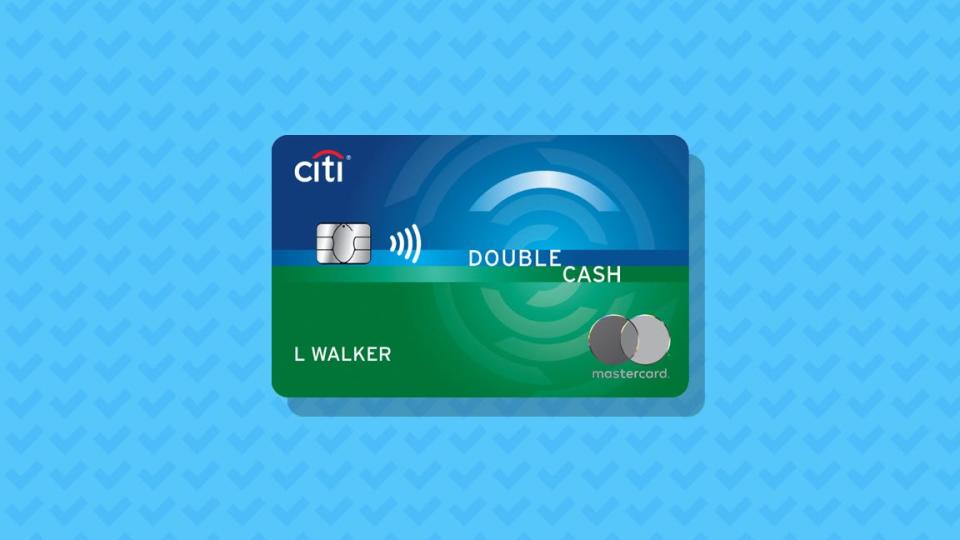The Citi Double Cash rewards you for everyday spending

— Our editors review and recommend products to help you buy the stuff you need. If you sign up for a credit card after clicking one of our links, we may earn a small fee for referring you. However, our picks and opinions are independent from USA TODAY's newsroom and any business incentives.
The Citi® Double Cash is one of the best no-annual-fee credit cards around for people who want to earn cash back without having to worry about pesky restrictions or fine print. The offer is simple: Earn 1% back on every purchase and another 1% back when you pay the bill. Very few cash-back cards give you more than 1.5% without limits or a laundry list of category restrictions.
Cash back is automatically added to your account for any and every purchase with no program activation required—how’s that for easy? Cash back can be redeemed for statement credit, direct deposit, check, or ThankYou Points. Right now, Citi is offering 0% APR for 18 months on balance transfers. All of these card perks come with no annual fee.
Citi Double Cash
Annual fee: None
Regular APR: 13.99% to 23.99%, based on your creditworthiness
Introductory balance transfer APR: 0% for 18 months
Regular balance transfer APR: 13.99% to 23.99%
Balance transfer fee: $5 or 3% of the transfer, whichever is greater
Points: 2% cash back (1% on every purchase + 1% when you make card payments)
Foreign transaction fees: 3%
Learn more about the Citi Double Cash
Need help finding products? Sign up for our weekly newsletter. It’s free and you can unsubscribe at any time.
Who should get the Citi Double Cash card?
Consider applying if you’re looking for a flat-rate, low maintenance card that has minimal fine print. You can just swipe, sit back, and watch as the cash back comes rolling in. This card can tag-team nicely with a category-specific cash-back card in your wallet. To help you maximize earnings, reach for the Citi Double Cash when you shop outside of your other rewards card's top bonus category.
Citi doesn’t publish a minimum credit score requirement, though you usually have the best shot at qualifying for a rewards card when your credit score is in the good to excellent range (670 or above on the FICO scale). Citi will set your credit limit after a review of your debt and salary.
What points do you get with the Citi Double Cash card?
Cardholders are rewarded in two ways—you'll earn an unlimited 1% cash back when you swipe and 1% cash back when you pay off purchases as long as you make payments on time. Say you use the card to buy a $1,000 couch—you’ll get $10 back right away and then 1% back after each card payment until you clear the balance.
A $1 rewards balance is all you need to convert cash back to Citi ThankYou Points, though when your cash-back balance reaches $25, your options expand. (To meet the minimum $25 cash redemption threshold, you need to charge at least $1,250 to the card and then pay off the balance.) At that point, you can redeem for a check, credit to your Citi checking or savings account, or a statement credit. Keep in mind that choosing a statement credit does not qualify as an eligible payment that earns 1% cash back.

What perks do you get with the Citi Double Cash card?
Here, you'll find basic protections that are pretty typical of most major credit cards. Fraud protection will alert you to unusual account activity and there’s zero liability if someone makes unauthorized purchases using your account. Admittedly, aside from these two perks, the cardmember benefits aren’t much to write home about.
The balance transfer special—0% APR for 18 months—is where this card shines. But watch out: Only balances transferred within the first four months of signing qualify for the deal, and there’s a 3% balance transfer fee to consider before moving money to the card. Also, interest will be charged on new purchases unless you pay off those purchases and the balance transfer by the due date at the end of the month.
How does the Citi Double Cash compare to other cards?
Compared to other cash back credit cards, you'll get more than the unlimited 1.5% back offered by the popular Capital One® Quicksilver® Cash Rewards credit card and the Chase Freedom Unlimited.
However, the Citi Double Cash doesn’t match up to them as far as the sign-on bonus goes. Spend $500 within the first three months of signing up for the Capital One Quicksilver, and you’ll get a $150 bonus. The Chase Freedom Unlimited offers a $200 bonus when you spend $500 within the first three months.
What drawbacks does the Citi Double Cash card have?
Cash back expires if you don’t earn or use rewards within 12 months, and the card also has a 3% foreign transaction fee. Fees incurred while traveling could add up pretty quickly if you plan to jet set with the card in tow.
Although there is a 0% introductory APR deal for balance transfers, there’s no interest-free vacation for new card purchases. Interest is charged on new purchases from the beginning, so try to avoid revolving a balance. And remember: Balances you transfer to the account do not qualify for cash back, and neither do returned items or cash advances.
How does the Citi Double Cash rank in our reviews?
The Citi Double Cash is one of our favorites for its simplicity and the fact that is has no annual fee—what you see is what you get. We’ve highlighted it as one of the best cards for new homeowners and travelers because it has no rewards cap and the 0% APR balance transfer deal lasts well over a year.
The Citi Double Cash card isn’t technically a travel card; a travel-focused card should come with no foreign transaction fee and extra travel perks. But you could still stand to benefit nicely from earning 2% cash back whenever you book domestic flights or pay for things like baggage fees. Plus, cash-back can be converted to ThankYou Points, which you can use to book airfare, hotel stays, or rental cars. Points converted from cash back can also be transferred to JetBlue’s TrueBlue loyalty program.
If you have the Citi Premier® or Citi Prestige® in your wallet, transferring points gets even sweeter—you may be able to add ThankYou Points earned with your Citi Double Cash to the rewards accounts of these two cards to unlock transfers to 15 international carrier loyalty programs, including Etihad Guest, Virgin Atlantic Flying Club, and Qantas Frequent Flyer.
So, should you get the Citi Double Cash?
The Citi Double Cash is ideal for shoppers who spend pretty evenly across all categories since you earn a flat rate no matter where you shop. If you spend heavily in one area—for example, groceries, gas, or dining out—you could probably do better with a category-specific card that gives you 3%, 5%, or 6% cash back for that spending. But for a free and low maintenance cash-back opportunity, the Citi Double Cash is one of our top picks.
Learn more about the Citi Double cash
Reviewed has partnered with CardRatings for our coverage of credit card products. Reviewed and CardRatings may receive a commission from card issuers.
Please note: The offers mentioned above are subject to change at any time and some may no longer be available.
Other top credit card options
The Chase Sapphire Preferred is the best credit card for travelers
The Capital One Quicksilver Cash Rewards credit card can help you save on big purchases
Things to know about credit cards
Long introductory period APR rates are only a short-term incentive. Potentially high APR rates snap into effect after the card’s intro period ends, which could cost you a lot in interest if you’ve left your balance unpaid. It’s really important—especially when getting a card for a big purchase—to keep an eye on your finances, and keep an eye on the calendar.
APR rates and credit limits vary based on your individual credit. Credit limits and interest rates for each card are determined based on each cardholder's personal situation, so we did not take that information into account when evaluating this card. Remember to pay your card off in full every month, so you will not be charged interest.
Banks have final say on who they accept for a credit card. These recommendations were put together with the assumption that applicants would have average or excellent credit. That being said, banks decide who they will issue credit cards to using criteria including, but not always limited to, an individual's credit score when evaluating each applicants.
How many credit cards should you have in your wallet?
We hate to break it to you, but there’s no one-size-fits-all answer here. The right number of credit cards for you depends on what you can responsibly manage.
Does having a piece of shiny plastic an arm’s length away often encourage you to spend money you don’t have? Be honest. Credit cards offer great benefits, but they also present an opportunity for overspending. You may want to think twice before applying for more credit. Carrying a balance you can’t afford contributes to interest charges, and in the long run costs you more money—money that you could’ve used for that air fryer you've been eyeing.
If you’re financially responsible and stick to making purchases that you can pay off, there may be some upsides to adding another card to your arsenal. If you’re a jet-setter without a card that rewards you for hitting the road, or one that skips foreign transaction fees, a travel credit card may make sense for you.
There are a few other things to consider before opening a new account, like adding a different payment processing network, or taking note of any annual fees.
Should you pay off your credit card every month?
Whenever possible, it is best to pay your balance in full every month. You’ll avoid interest charges, for one, and you’ll also maintain a low credit utilization ratio. This percentage is calculated by dividing your monthly balance by your total credit line, and experts recommend keeping it at or below 30%.
But we also get that life happens, and sometimes you bring home less bacon than you anticipated, or an unexpected expense rears its pricey head. Whatever you do, make the minimum payment, and make it on time.
If you can’t swing the whole balance but you do have some cash to spare, consider paying a little more than what you have to pay. This will help lower your utilization ratio, minimize interest, and keep your credit score in check. We love a good compromise, don’t you?
The product experts at Reviewed have all your shopping needs covered. Follow Reviewed on Facebook, Twitter, and Instagram for the latest deals, reviews, and more.
This article originally appeared on Reviewed: Citi Double Cash review: Unlimited cash back with no annual fee

